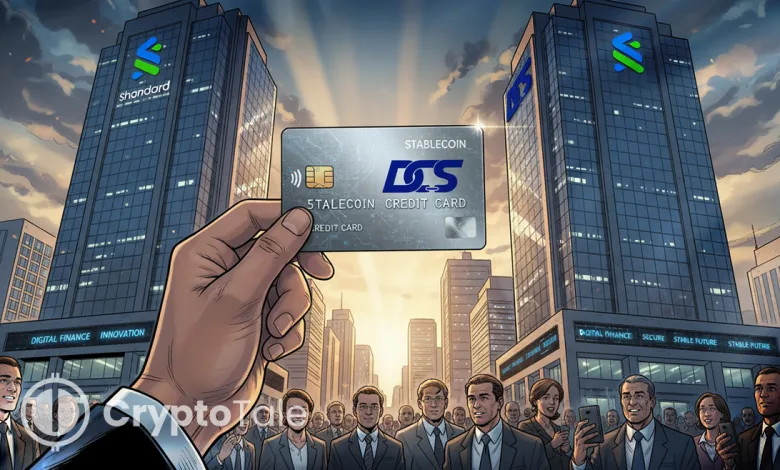Standard Chartered Drives Web3 Payments Through DeCard

- DeCard allows stablecoin spending like regular cards using Standard Chartered’s banking.
- The partnership integrates crypto with regulated payment systems starting from Singapore.
- It connects Web3 technology with finance for faster, transparent global transactions.
Standard Chartered has partnered with DCS Card Centre to support DeCard, a new credit card allowing stablecoin spending in everyday transactions. The initiative begins in Singapore, where regulators promote digital payment innovation before expanding globally. Both firms announced the collaboration on Tuesday.
DeCard is designed to make stablecoin spending as easy as using a traditional credit card. It connects digital assets to established payment networks, allowing users to pay at merchants without manual conversions. The setup eliminates volatility risks, enabling smoother payments and real-time verification across channels.
The collaboration designates Standard Chartered as the main banking partner. Visa holders of DeCard will be given virtual account services, API connectivity, and transaction support. The payment processing system ensures that payments are instantly reconciled, providing unhindered settlement even if a number of transactions are involved.
Seamless Payment Experience Through Integration
Through its virtual account network, Standard Chartered will allow DCS to create unique accounts for every DeCard holder. Each account can process incoming payments in real time, linking stablecoin settlements with fiat operations. The technology enables instant verification and transparent transaction matching.
Moreover, the financial institution will handle all activities in the background, such as treasury, settlement, and liquidity management. The first phase of the program still only allows Singapore-based users, in line with the local financial regulations.
DCS Card Centre is responsible for DeCard’s development and operation, which is why it introduced D-Vault—a tool for crypto settlement and payment tracking. It also increases user control and transparency by monitoring transaction flows. The project is a result of a partnership between Diners Club Singapore and DCS and marks the latter’s evolution into a payments provider, leveraging over five decades of experience.
This card, linked to Web3, will also give way to new digital incentives and user experiences. The partnership combines financial dependability with blockchain speed, thus providing users in the regulated environment with the dual advantage of secure and fast transactions.
Bridging Traditional and Decentralized Finance
The partnership aligns with Standard Chartered’s ongoing support for fintech development. According to Dhiraj Bajaj, Global Head of Transaction Banking FI Sales at Standard Chartered, “Our investments in our platforms, capabilities, and solutions allow us to be the trusted banking partner bridging TradFi to DeFi.”
The move builds on the bank’s prior advocacy for blockchain adoption. Chief Executive Officer Bill Winters has previously discussed moving financial transactions onto blockchain systems. This initiative marks a practical step toward that vision, connecting stablecoins with global payment rails.
Stablecoins, whose total supply recently surpassed $301 billion, have become critical for linking crypto liquidity with real-world utility. By enabling stablecoin payments, Standard Chartered and DCS are addressing a long-standing challenge—secure and compliant crypto spending.
Expanding the Reach of Digital Assets
Stablecoins are quickly becoming mainstream, yet credible banking partners are necessary. In today’s scenario, the number of crypto-friendly banks is minimal; therefore, Standard Chartered’s participation becomes very important for mass adoption. The partnership enhances security and trust by mixing traditional financial regulation with modern payment methods.
Related: Bitcoin Could Dip Below $100K—Standard Chartered Predicts
The project’s Singapore launch is the government’s regulated platform for future expansion into other territories. The Singapore government has been very supportive of the fintech industry, and thus, it is a suitable place for the project to begin.
As the DeCard ecosystem develops, its acceptance could shift the standards for the intersection of daily transactions with blockchain assets and the global finance infrastructure.




